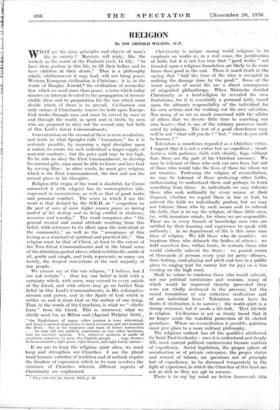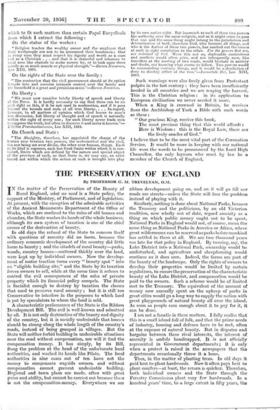RELIGION
By SIR ARNOLD WILSON. M.P.
WHAT are the aims, principles and objects of man's life in society ? Marxists will. reply,. like the wicked, in the words of the Psalmist (xvii, 14-15) : " to have their portion in this life, to fill their bellies and to have children at their desire." That is a philosophy which, whithersoever it may lead, will not bring peace.
Western European civilisation is Christian ; it is, in the words of Douglas Jerrold,* the civilisation of reconcilia- tion which we need more than peace, a term .which today denotes an interval devoted to the propagation of irrecon- cilable ideas and to preparation for the war which must decide which of . them is to prevail. Civilisation can only endure if Christianity renews its hold upon Europe. God works through man and must be served by man in and through the world, in spirit and in truth; by men who are prepared to obey not the second only but both of Our Lord's Great Commandments.
Concentration on the second of these is mere secularism, and leads to what Spengler calls " Caesarism," for it is certainly possible, by imposing a rigid discipline upon a nation, to assure for each individual a larger supply of material comforts ; but the price paid may be too high.
To be able to obey the First Commandment, to develop his natural gifts, man must be able to know and love God by serving Him : in other words, he must give religion, which is the First Commandment, the first and not the second place in his thoughts.
Religion (the origin of the word is doubtful, for Cicero connected it with relegere) has its contemplative side, expressed in monasticism, as well as that of good works and personal conduct. The sense in- which I use the word is that defined- by the -0.E.D..as " recognition on the part of man- of some higher unseen power as having control of his destiny and as being entitled to obedience, reverenee and worship." The word comprises also " the general mental and moral attitude resulting from this belief, with reference to its effect upon the individual or the community," as well as the " acceptance of this feeling as a standard of spiritual and practical life." Our religion must- be that of Christ, at least to the extent of the Two Great Commandments and in the broad sense of the definition quoted above, which is within the ambit of all, gentle and-simple, and truly represents, as many can testify, the deepest convictions of the vast majority of our people. .
We cannot say of this our religion, " I believe, but I am not certain " ; thus far, our belief is held with' a certainty which, with some, may extend to every article of the Creed, and with others may go no further Than belief in Our Lord's Commandments, in His redemptive mission and power, and in the Spirit of God which is within us and is from God as the author of our being. That, in the words of the Catechism, is what we " chiefly learn " from the Creed. This is, moreover, what we chiefly need, for, as Milton said (Against Prelatry 1641)
" the Englishman of many other nations is least atheistical, and bears a natural disposition of much reverence and awe towards the Deity : but in his weakness and went of better instruction . . he may fall not unlikely sometimes, as any other landman, into an uncouth opinion. Yet, wherever mention is made of countries, manners, or men, the English people . . . may deserve to be accounted a right pious, right honest, and right hardy nation.',
If we are to keep the religious spirit alive, we must keep and strengthen our Churches. I use the plural word because varieties of tradition and of outlook require the freedom of expression which in its turn involves the existence of Churches wherein different aspects . of Christianity are emphasised.
• They that lake the Sword, 1835, p. 18. Christianity is unique among world religions in its emphasis on works as, in a real sense, the justification of faith, but it is not less true that " good works " not founded upon a religious foundation are likely to do More harm than good in the end. There is much truth in the saying that " half the time Of the wise is occupied in undoing the damage done by the good." Some of the worst aspects of social life are a direct consequence of misguided philanthropy. When Nietzsche derided Christianity as a herd-religion he revealed his own limitations, for it is essentially a personal faith, based upon the ultimate responsibility of the individual for his own actions and for working out his own salvation. Too many of us are so much concerned with the affairS of others that we devote little time to searching our own hearts—that is one of the Salutary proCesses incul- cated by religion. The test of a good churchman may well be not " what will you do ? " but, " What do you wish to become ? "
Toleration is sometimes regarded as a Christian virtue. I suggest that it is not a virtue but an expedient ; stead- fastness with patience; faith with charity, hope without fear, these are the part of the Christian armoury. We may be tolerant of those who seek our own lives, but not of those who would take the lives of those for whom we are trustees. Professing. the religion of reconciliation, we may he tolerant of those professing other faiths,' endeavouring to understand them and perhaps to learn something from them. As individuals we may tolerate those who seek militantly by every means at their disposal, whether we regard • them as fair or foul, to subvert the faith we individually profess, but we may not tolerate those who by such means seek to subvert the faith, that is to say- the religion, of those little ones, i.e., with immature minds, for whom we are responsible: There are in every branch of knowledge men who are entitled by their learning and experience to speak with authority ; in no department of life is this more true. than of religion. We kill those who do murder : we imprison those who debauch the bodies of others : we hold ourselves free,: within limits; to restrain those who. would violently subvert the State : we punish scores of thousands of persons every year for petty7 offences, from betting, card-playing and pitch and toss in a public place to singing (not for money but for joy) on a fine evening on the high road.
Shall we refuse to condemn those who would subvert; not our political institutions and customs, many of which would be improved thereby (provided they, were not wholly destroyed in the .process), but the moral foundation of our collective civilisation and of our individual lives ? Toleration must have its limits if civilisation is to survive : the world-spirit is a strong swimmer, but it needs a life-belt. That life-belt is religion. Civilisation is not so firmly . based that it no longer needs the watchful protection of its elected guardians. Where no reconciliation is possible, quietism must give place to. a more militant philosophy.
The religious outlook has all the qualities attributed by Saint Paul to charity : once it is understood and deeply felt, most current political controversies .become matters of expediency. Social legislation, the proper sphere of socialisation or of private enterprise, the proper status and reward of labour, are questions not of principle but of expediency, to be discussed temperately in the light of experience, in which the .Churches of this land are not as rich as they are apt to assume.
There is to my lay mind no better framework into which to fit such matters than certain Papal Encyclicals from which I extract the following : On the status of the worker : "Religion teaches the wealthy owner and the employer that their workpeople are not to be accounted their bondsmen ; that in every man they must respect his dignity and worth as a man and as a Christian . . . and that it is shameful and inhuman to treat men like chattels to make money by, or to look upon them merely as so much muscle or physical strength."—Rerum Novarum, Leo XIII, 1891.
On the rights of the State over the family : " The contention that the civil government should at its option intrude into and exercise intimate control over the family and the household is a great and pernicious error."—Rerum Novartnn.
On liberty : "We must now consider briefly liberty of speech and liberty of the Press. It is hardly necessary to say that there can be no such right as this, if it be not used in moderation, and if it pass beyond the bounds and ends of all true liberty. . . . In regard, however, to all matters of opinion which God leaves to man's free discussion, full liberty of thought and of speech is naturally within the right of every one ; for such liberty never leads men to suppress the truth, but often to discover it and make it known."— Libertas Praestantiesiatum, Leo X111, 1888.
On Church and State : " The Almighty, therefore, has appointed the charge of the human race between two powers, the ecclesiastical and the civil, the one being set over divine, the other over human, things. Each in its kind is supreme, each, has fixed limits within which it is con- tained, limits which are defined by the nature and special object of the province of each, so that there is, wo may say, an orbit traced out within which the action of each is brought into play by its own native right. But inasmuch as each of these two powers has authority over the same subjects, and as it might come to pass that one and the same thing might belong to the jurisdiction and determination of both, therefore God, who foresees all things, and who is the Author of these two powers, has marked out the course of each in right correlation to the other. For the powers that are, are ordained of God. Were this not so, deplorable contentions and conflicts would often arise, and not infrequently mon, like travellers at the meeting of two roads, would hesitate in anxiety and doubt., not knowing what course to follow. Two powers would be commanding contrary things, and it would be a dereliction of duty to disobey either of the two."—/mmortafe Dei, Leo XIII, 1885.
Such .warnings' were also freely given from Protestant pulpits in the last century : they have been insufficiently heeded in all countries and we are reaping the harvest. This is the Christian religion : in its application to European civilisation we never needed it more.
When a King is crowned in Britain, he receives from the Archbishop of York a Bible with such words as these : " Our gracious King, receive this book, The most precious thing that this world affords ; Here is Wisdom : this is the Royal Law, these are the lively oracles of God."
I believe that to be the most vital part of the Coronation Service. It would be more in keeping with our national life were the words to be pronounced • by the Lord High Chancellor, the only layman who must by law be a member of the Church of England,





























































 Previous page
Previous page